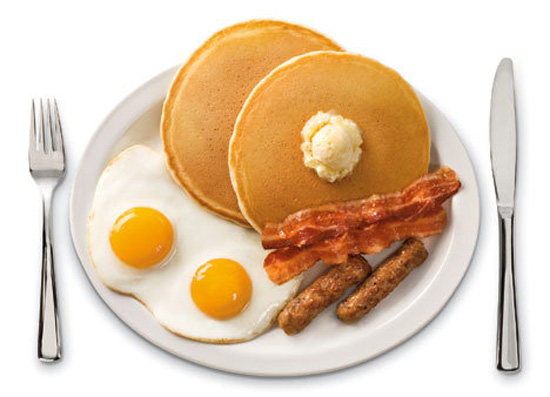Breakfast: To Eat or Not to Eat?
 The topic of breakfast is once again in the news. In one study, published in the American Journal of Clinical Nutrition, researchers divided overweight or obese people into three groups. One group was told to skip breakfast, one was told to eat breakfast, and ones was told to follow their usual regimen. After 16 weeks, there was little to no change in body weight among the three groups.
The topic of breakfast is once again in the news. In one study, published in the American Journal of Clinical Nutrition, researchers divided overweight or obese people into three groups. One group was told to skip breakfast, one was told to eat breakfast, and ones was told to follow their usual regimen. After 16 weeks, there was little to no change in body weight among the three groups.
In a second study, researchers found that there was no change in metabolism between people who ate nothing for breakfast and those who ate 700 calories before 11 am. Also, the people who didn’t eat breakfast took in fewer calories over the course of a day. On the flip side, the breakfast eaters burned off more calories and had more stable blood glucose levels than those who skipped breakfast.
Have the benefits of eating breakfast been debunked?
It’s easy to get caught up in the latest research study you read about. In many cases, though, the media leaves out important details about the study. Or, the researchers themselves didn’t look at certain factors, such as what the subjects actually ate for breakfast, how much they ate, or how the results may have been different had normal or underweight people been in the study. My advice? Don’t write off breakfast just yet.
Why eating breakfast is a good thing
Your mother was right all along: eating breakfast really is good for you. Based on other research studies, we’ve learned that people who eat breakfast are more likely to:
- Have an easier time losing weight and keeping it off
- Consume more vitamins, minerals and fiber, and less fat and cholesterol
- Have lower LDL (bad) cholesterol levels
- Be in a better mood
- Have improved concentration
- Achieve and maintain better blood glucose control (if they have diabetes)
What’s the best breakfast?
 Of course, it’s important to make sure you eat the “right” kind of breakfast. Grabbing a coffee and doughnut won’t do you any favors. What you “break your fast” with in the morning can have a big impact on your weight, your health and your mood. Here’s what makes up a great breakfast:
Of course, it’s important to make sure you eat the “right” kind of breakfast. Grabbing a coffee and doughnut won’t do you any favors. What you “break your fast” with in the morning can have a big impact on your weight, your health and your mood. Here’s what makes up a great breakfast:
- Whole grains. Nix the white toast and sugary cereals. Instead, choose whole grain foods like steel cut oatmeal, whole wheat bread or whole-grain waffles.
- Lean protein. Protein is a nutrient that can keep hunger at bay, sustain your blood glucose, and help you keep your lean body mass. Add a boiled egg, low fat cottage cheese or Greek-style yogurt to your morning meal. Don’t overlook salmon, turkey or lean red meat, either.
- Healthy fat. Like protein, fat helps you control your appetite. Peanut or almond butter, olive oil and avocadoes are great additions to any breakfast.
- Fruits and vegetables. Stick with fresh fruit rather than fruit juice. And why not add veggies? They’re perfect with an omelet. Fruits and vegetables give you energy, vitamins, minerals and fiber.
Bottom line: aim to eat breakfast as often as you can. Choose the right types of breakfast foods and you’ll feel better, too.

